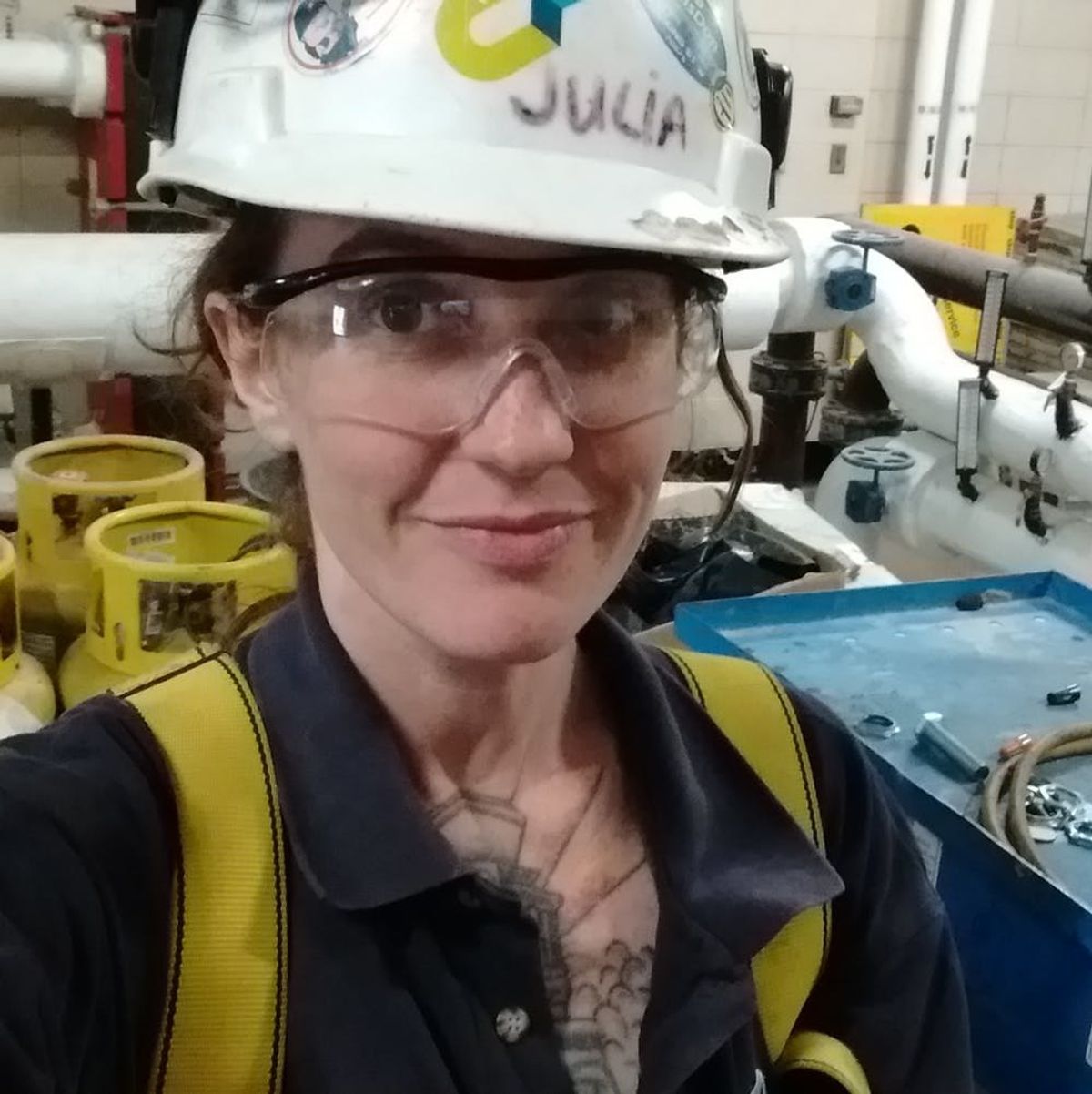“Visibility and presence are changing our industry for the better.”
Cutting the Wires: A Female Electrician Tells All

While finishing her liberal arts degree at a prestigious university, Julia Wagner Brady came to realize that the job options she’d have at graduation weren’t her cup of tea. The Toronto, Canada resident decided to switch gears and learn a trade. Since February 2014, Julia has been working as an electrician.
We chatted with Julia about what it’s like to be one of the small minority of women working in her field.

Brit + Co: What made you choose this field?
Julia Wagner Brady: While completing an undergrad I worked part-time at Bikechain, a campus bicycle shop, where I discovered the joys of making broken things work again. Knowing next to nothing about the trades in general, I thought electrical work would be the last thing someone would want to do themselves. It seemed to me like a practical skill set that I could use to make people’s lives better. I thought (still do!) I might be able to do some volunteering when I get licensed. Getting into a trade also seemed like a way to be independent and self-reliant. So far that has been true.
Describe a typical day on the job.
The crew meets in our lunchroom, an area up on the eighth floor of the building we are working in. It measures about 400 square feet and is framed in by two-by-fours covered in white tarpaulins. Everyone has a hook under a shelf, like in kindergarten, where we have each written our names. We start at 6:30 am, but showing up then would seem late. People say good morning upon arrival, and settle into the same seats they always occupy. The foreman may have an announcement regarding safety or paying up for the group lottery, or may not, and eventually, someone puts his hard hat on and the work begins.
If we did not finish the task from the day before, it’s okay to breeze past the foreman without saying much. This is, in my opinion, optimal. Should the previous day’s work have run out, we ask for a new task. We may be paired up with another worker or alone. Quite often apprentices are partnered up with more experienced journeypersons. The pairs and configurations are dynamic, though, and will change depending on the job.
All of the electricians all take breaks at the same time, although some of us forgo the lunch room for the outdoors, or head down into the shopping concourse. The breaks are at 9 am and noon and they last 15 and 30 minutes, respectively. I used to find it difficult to eat my lunch in a half hour, but have become more or less used to wolfing food down now. This particular job is to restore a building that was damaged by smoke following a fire in an adjacent hydro vault. Other jobs I’ve been on have included subway stations, a new hospital, an existing hospital, and a few different offices. Every location is different, and will require a different number of workers. Sometimes we start the day earlier, sometimes we work the night shift.
How many women do you know in your field?
There are five women who I can be in touch with, one of whom is at the same job site as I am right now.
What are the challenges of being a woman in your industry?
Bathrooms can be a challenge —not so much getting them designated as for women, but enforcing that designation. I find it challenging to manage the conversations that men strike up with me sometimes. I think they are more likely to want to chat with me, but if I were to spend as much time with everyone as they wanted I’d get nothing done, so I have to interrupt quite often and end a conversation. Early on in this career, I thought I was becoming paranoid; I felt I was being watched all the time. It turns out I probably am being looked at a lot more often than I would out in the wild, and frankly I find that aspect exhausting, although I’ve become much more comfortable.
What do you like about your work?
I love the troubleshooting and problem solving that goes on when I’m making changes to an existing building. In the case of a brand new build, I enjoy how meditative it can be to make every wire the length of my elbow to wrist; every joint as long as my outstretched middle fingertip to extended thumb end; every receptacle square perfectly flush with its cover. There is incredible satisfaction to be found in knowing you’ve done a job well. Even on days when things don’t go my way, I can tell myself I did my best.
I also love leaving work at work. We end our day at 2:45, meaning I can be at home or at the pool by 3:15ish, showered and changed into normal clothes by 4… I sometimes feel I get to have two lives, both of which are good.
Do you think women approach the work in a different or unique way that could change the industry for the better?
I think I would be foolish to make any claims on behalf of all women, because women aren’t always born the way we end up deciding to live, and we come in all types of different shapes and sizes with interests and aptitudes abounding. Simply seeing more women and trans folks in the workforce will make it a better place. Visibility and presence are changing our industry for the better.
![]() (Photo via Julia Wagner Brady)
(Photo via Julia Wagner Brady)



















